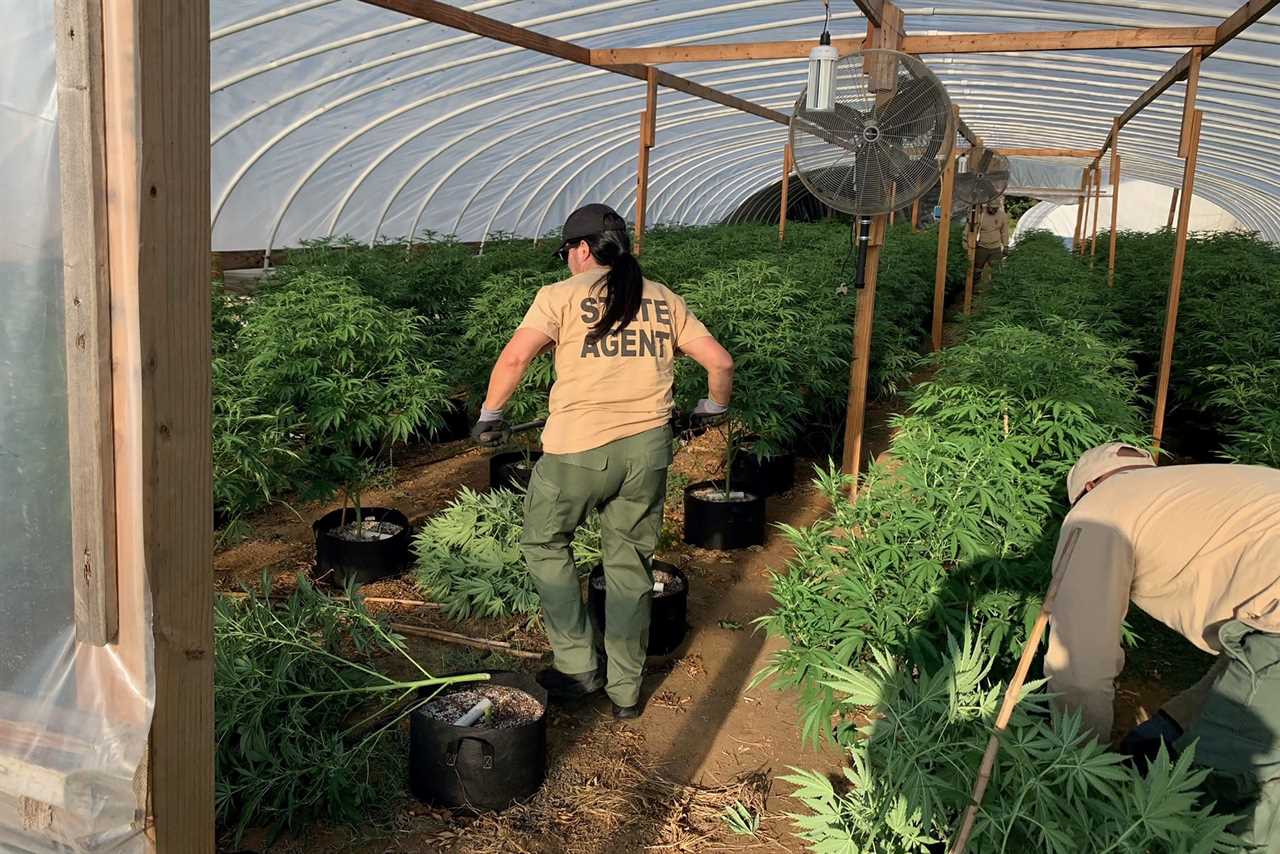
LOVE COUNTY, Okla. — Shortly after sunrise on July 22, a dozen or so police officers from across Oklahoma descended on a property about 15 miles north of the Texas border. They moved past the fence with the “No Trespassing” signs and the pink building with the aluminum roof toward a collection of hoop houses. They didn’t know much about the occupants, although the cops strongly suspected they were of Chinese descent.
“We pulled in like gangbusters,” recalled Love County Sheriff Marty Grisham, on a recent weekday afternoon. “The guy who spoke Mandarin got on the loudspeaker, and I don’t know what he was saying, but I'm sure: ‘Come out with your hands up,’ or that sort of thing.”
Ultimately, officers confiscated more than 2,300 marijuana plants with an estimated street value of $3.5 million, and about $65,000 in cash. Two men — Zhimou Chen and Chong Chen — were taken into custody and officials charged Zhimou with cultivation of an illegal controlled substance. Officials said the farm didn’t have a valid license, rendering otherwise legal marijuana into illicit goods.
Scenes like the one in Marietta have become routine in south central Oklahoma and other rural parts of the state in recent months. There have been similar raids in the nearby farming towns of Tishomingo, Gene Autry and Pauls Valley. In fact, the July raid on the Love County property was among the smaller enforcement operations in the area. The June raid in Gene Autry, for example, netted approximately 27,000 plants with a street value of $50 million. They also discovered about 45 workers living on the property, in what Carter County Sheriff Chris Bryant described as “horrible conditions.” Altogether, the Oklahoma Bureau of Narcotics estimates that there have been at least five dozen raids of illegal marijuana cultivation operations since the crackdown began in April, a phenomenon that was largely nonexistent up until that point.

“We all know that things are going on,” Grisham said of other potential operations in Love County. “There’s probably some human trafficking going on. There’s probably some money laundering going on. There’s a lot of things going on behind the fences of those places.”
Oklahoma’s medical marijuana program has seen such staggering growth since it launched three years ago after voters overwhelmingly backed a ballot referendum that it has earned the wry nickname “Tokelahoma.” More than 380,000 Oklahomans — or nearly 10 percent of the state’s population — have enrolled in the program, making it by far the largest in the country on a per capita basis. Thanks to Oklahoma’s free market approach to legalization — there are no limits on marijuana business licenses and the cost of a license is just $2,500 — there are more than 9,000 grow operations in Oklahoma. To put that figure in perspective, Pennsylvania — which has more than three times the population of Oklahoma — has just 13 licensed grow operations to supply its medical program. Even California, the world’s biggest legal cannabis market, has about 3,000 fewer grow operations than the staunchly conservative Sooner State.
One of the biggest selling points for legalization, and one that proponents made during the referendum three years ago, is that it eliminates the need for an illicit market — and the violence and crime that often comes along with it. Instead, much to the chagrin of state officials, the state’s free-wheeling medical marijuana program has proven to be a magnet for bad actors from across the country. And it has brought into conflict two long-standing and important strains of the state’s conservative makeup: a laissez-faire attitude toward business regulation and a history of harsh treatment of drug offenders.
“It’s like paradise,” said Lawrence Pasternack, a philosophy professor at Oklahoma State University and marijuana legalization advocate, pointing out that Oklahoma has some of the cheapest land in the country. “Did anybody in our state realize this? … You would have thought that somebody from law enforcement would have said to the state, ‘This is what’s going to happen, everybody. You’re going to have every criminal enterprise in the world coming to Oklahoma to grow.’”
The weakness in the system turned out to be the one significant restriction on obtaining a business license: To qualify, applicants with at least a 75 percent ownership stake have to show that they had lived in Oklahoma for at least the last two years (or five continuous years of the previous 25 years). That proved to be an easy rule for applicants to flout with “ghost” owners.
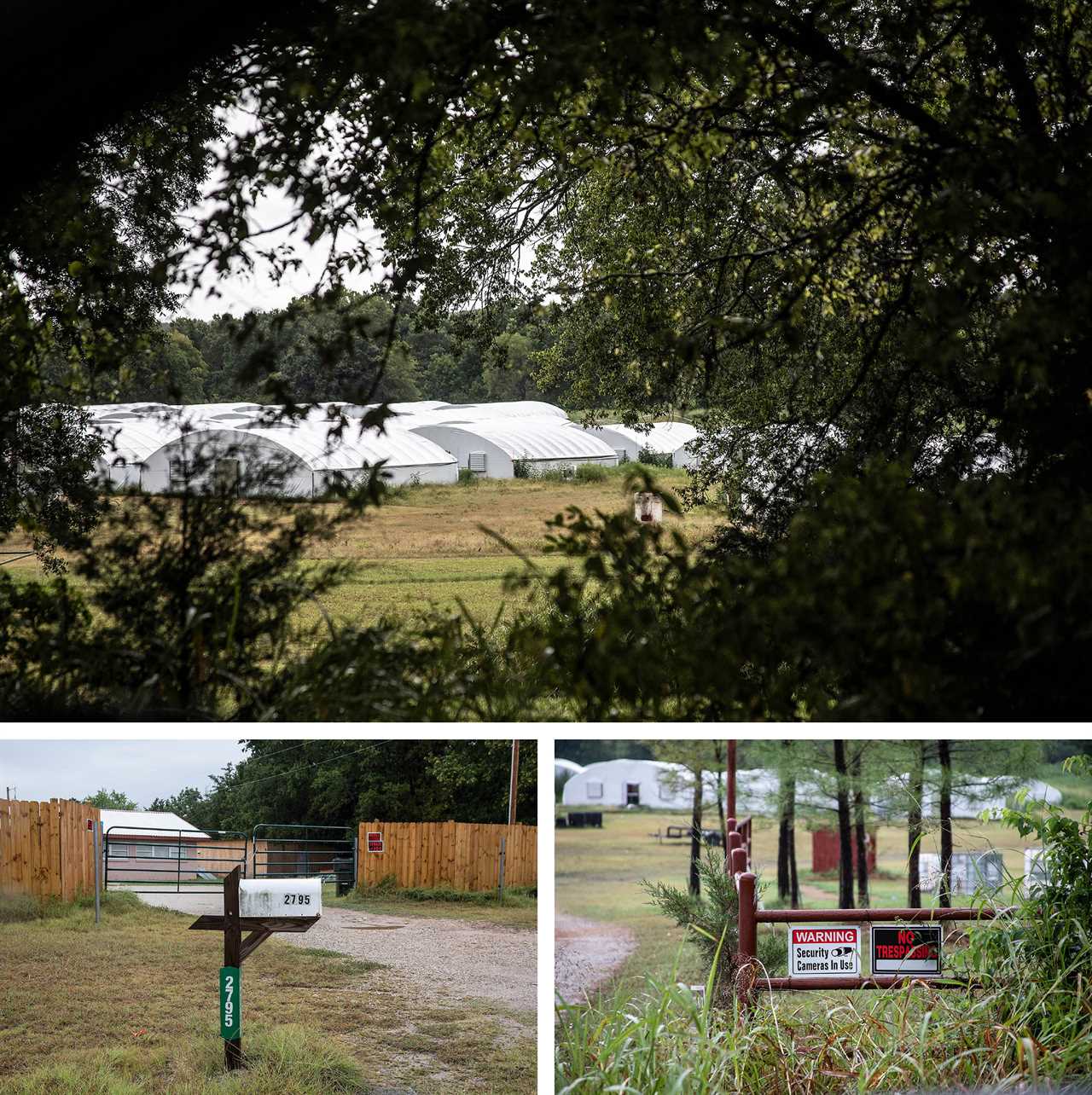
Law enforcement officials charge that many of these “ghost” owners conceal international criminal syndicates with roots in China, Mexico — and even Bulgaria. These foreign ties to the ghost owners have not been conclusively established in court, but the scope of the ghost-owner scandal has given Oklahomans plenty to speculate about. According to court records, a single Oklahoma resident — a secretary at a law firm, of all places — is listed as the owner on hundreds of businesses. Almost all of the marijuana from these outlaw operations, say officials, ends up out of state and sold on the illicit market.
“It’s overwhelming. It is stretching our resources about as thin as they’ve been stretched,” said Mark Woodward, the spokesperson for the Oklahoma Bureau of Narcotics and Dangerous Drugs, pointing out that the agency is simultaneously dealing with an epidemic of methamphetamine and opioid addiction. “We’re also having to deal with these criminal elements that for the last year or so have basically been pouring into Oklahoma and overwhelming our law enforcement resources.”
Oklahoma officials now face a conundrum: how aggressively to crack down on an industry that’s become an unlikely bedrock of the state’s economy. Tax revenues are on pace to exceed $150 million this year and whole sectors of the economy — from real estate to building contractors to advertising agencies — now depend on legal marijuana income. Almost nobody wants to abolish it altogether, but even the staunchest libertarians are calling for more enforcement of the rules to protect legitimate business owners.
“There's always been a spirit of apathy, if you will, from our Department of Health as to how they've rolled this out, and that spirit of apathy has absolutely affected enforcement of the program,” said Chip Paul, a libertarian legalization advocate who played a key role in passing the 2018 medical marijuana referendum. “The word went out on the black market that Oklahoma was a place that you could come set up shop, and they weren't going to come enforce the law, and you could do what you wanted.”

But lawyers who represent business owners who have lost their licenses, or are at risk of being shut down, say many of them are simply struggling entrepreneurs who thought they were doing everything right to operate legally. Instead, they received dodgy legal advice from scurrilous law firms seeking to rack up huge profits from Oklahoma’s weed rush. Many of them are immigrants with spotty knowledge of English, these lawyers point out, who were recruited from around the country to stake a marijuana claim in Oklahoma.
In other words: They are victims, not criminals.
“They should allow the people who are legitimate, honest actors to fix the situation,” said Ron Durbin, a Tulsa attorney with dozens of cannabis clients. “Anybody that is acting illegally, or in bad faith, or was doing this as part of a criminal conspiracy, try them. But that's not the people that are calling my office.”
Oklahoma marijuana legalization advocates are pushing to put a petition on the ballot next year that would expand legal access to anyone at least 21 years old. But the proliferation of illegal grows and law enforcement raids has sparked a backlash that could lead the state’s deeply conservative voters to reject the measure.
“The lack of enforcement on the medical program has put the marijuana program in a negative light in the eyes of average Oklahoma citizens,” said Republican state Rep. Scott Fetgatter, who has been deeply involved in cannabis issues at the Capitol.
“It used to be daily, but it’s kind of weekly now, somebody talks to me in my district about how frustrated they are with the program, about how they would not vote for it again had they known what it was going to turn into.”
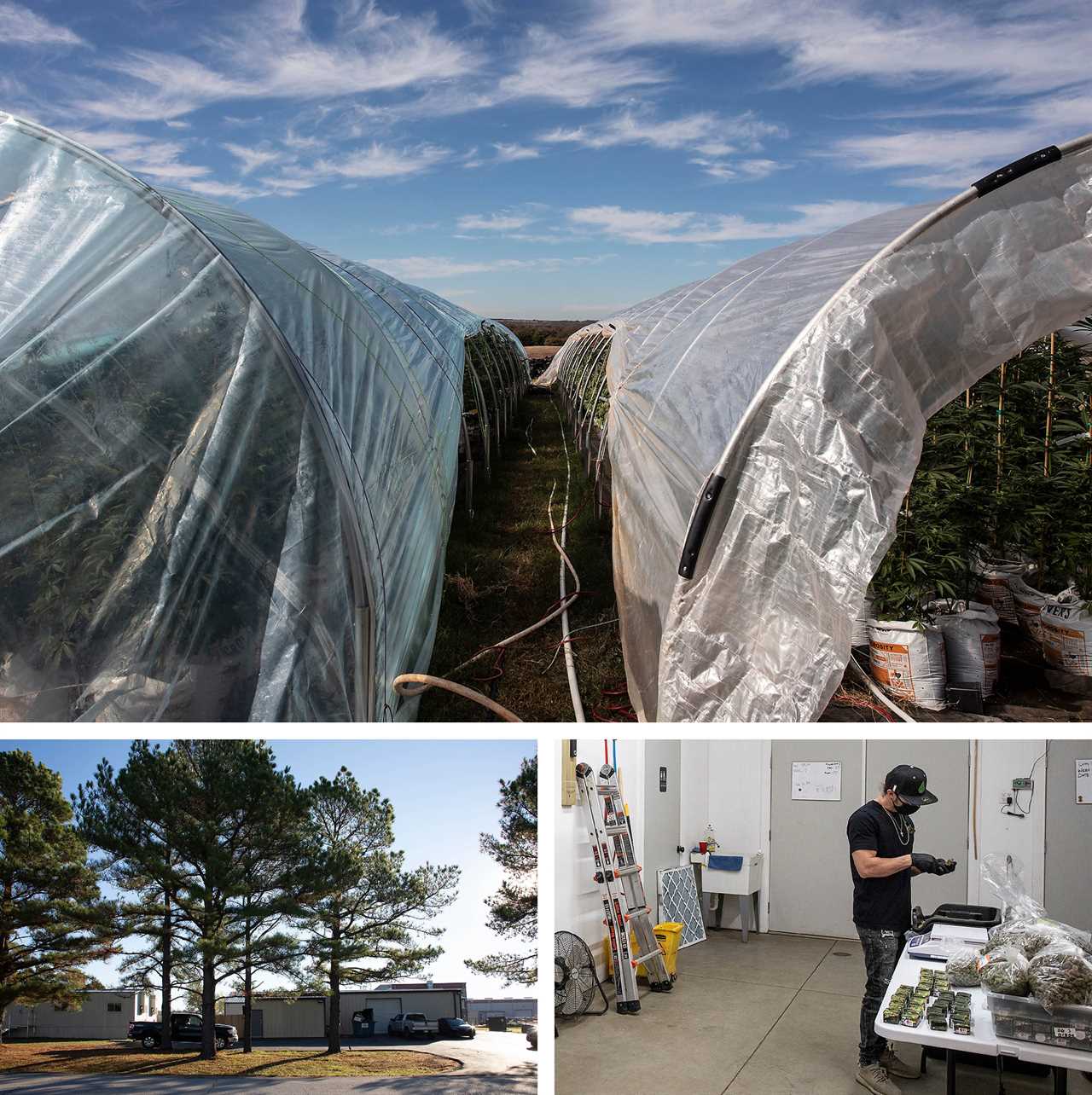
‘I’ve seen the dark side of it’
Some people think illegal weed has been part of Oklahoma’s medical marijuana market from the moment the first dispensaries opened for business in November 2018. There was no way, they say, that licensed cultivators could have produced crops in time for the start of sales, yet somehow retailers’ shelves were full.
“It was clearly an issue from day one,” said Bill Moore, who has worked as a pharmacist for nearly two decades, with shops in Ardmore and Marietta.
Moore was initially wary of Oklahoma’s medical marijuana program, since he’d seen close up the ravages that drugs have caused his clients.
“I’ve seen the dark side of it, I guess you'd say, doing what I do,” Moore lamented on a recent weekday afternoon. “Seeing people come in and cry for their Norco or their Xanax or their Oxycodone.”
But Moore quickly came to appreciate the potential therapeutic benefits of medical marijuana, whether in helping people reduce their dependence on opioids or in treating ailments like insomnia or anxiety. He opened the NatureMeds dispensary in Ardmore shortly after medical sales began in 2018, and then added a second shop in nearby Ada in 2020.
But competition is brutal in the dispensary business in Oklahoma. As of Nov. 10, there were 47 licensed medical marijuana shops in Ardmore, a town of about 25,000 residents. In Ada, with a population of roughly 17,000, there were 18 licensed dispensaries. Statewide, there’s nearly one licensed dispensary for every 150 patients enrolled in the program.
“Margins are too slim to make any real money,” lamented Moore, a baby-faced 48-year-old wearing a green polo shirt and seated at conference table inside the NatureMeds dispensary in Ardmore. “We get excited every time one shuts down, but you drive around the corner and another one's opened up.”
Indeed, the signs of Oklahoma’s booming medical marijuana market can be seen all over this region of the state. Hoop houses dot rural roads. Pot shops are located in seemingly every strip mall. Weed billboards offering pre-roll specials adorn the highways.

But the weed rush has morphed into something different over the last year, as the area has seen an influx of out-of-state residents buying up large tracts of land and starting cultivation operations.
Kori Thompson has witnessed how this wave of buyers has roiled the real estate market in south central Oklahoma. Her realty business is hard to miss in Ardmore: It’s a big pink building emblazoned with the acronym “I.S.H.” (I Sell Houses) along the town’s main commercial strip.
Thompson estimates that 20 percent of her business is now selling properties for weed operations. The company’s web site features a “420” section devoted to properties that are set up for cultivation. Property prices have skyrocketed by about 40 percent in the area this year, Thompson says, and anything priced below $500,000 typically sells within 30 days.
“The marijuana people are coming in and competing with the homebuyers. The homeowners don’t have a chance,” Thompson said, seated in the lobby of the real estate firm, which is furnished with pink chairs, pink couches and pink throw rugs, as well as various slogans testifying to the power of Jesus. “A lot of times they’re coming in with cash. So that is just driving up the market. Even though the prices are increasing, the sales aren’t slowing down.”
But the market boom has also sparked racial tensions. The population of Carter County, which includes Ardmore, is about 70 percent white, according to census data. But many of the weed entrepreneurs scooping up land are of Asian descent. Thompson says that some clients, particularly older people, will tell her that they don’t want to sell to them.
“You absolutely cannot say that to me,” Thompson said she tells the sellers. “That’s completely illegal. You cannot discriminate against race.”
Those tensions have been exacerbated by the series of raids that have taken place in the area in recent months, since many of the people facing criminal charges are Asian. But most weed entrepreneurs in the area insist racial animosity isn’t driving their concerns. Instead, they point out that it’s nearly impossible to run a viable business when some operators aren’t following the rules in what’s an already brutal competitive climate.
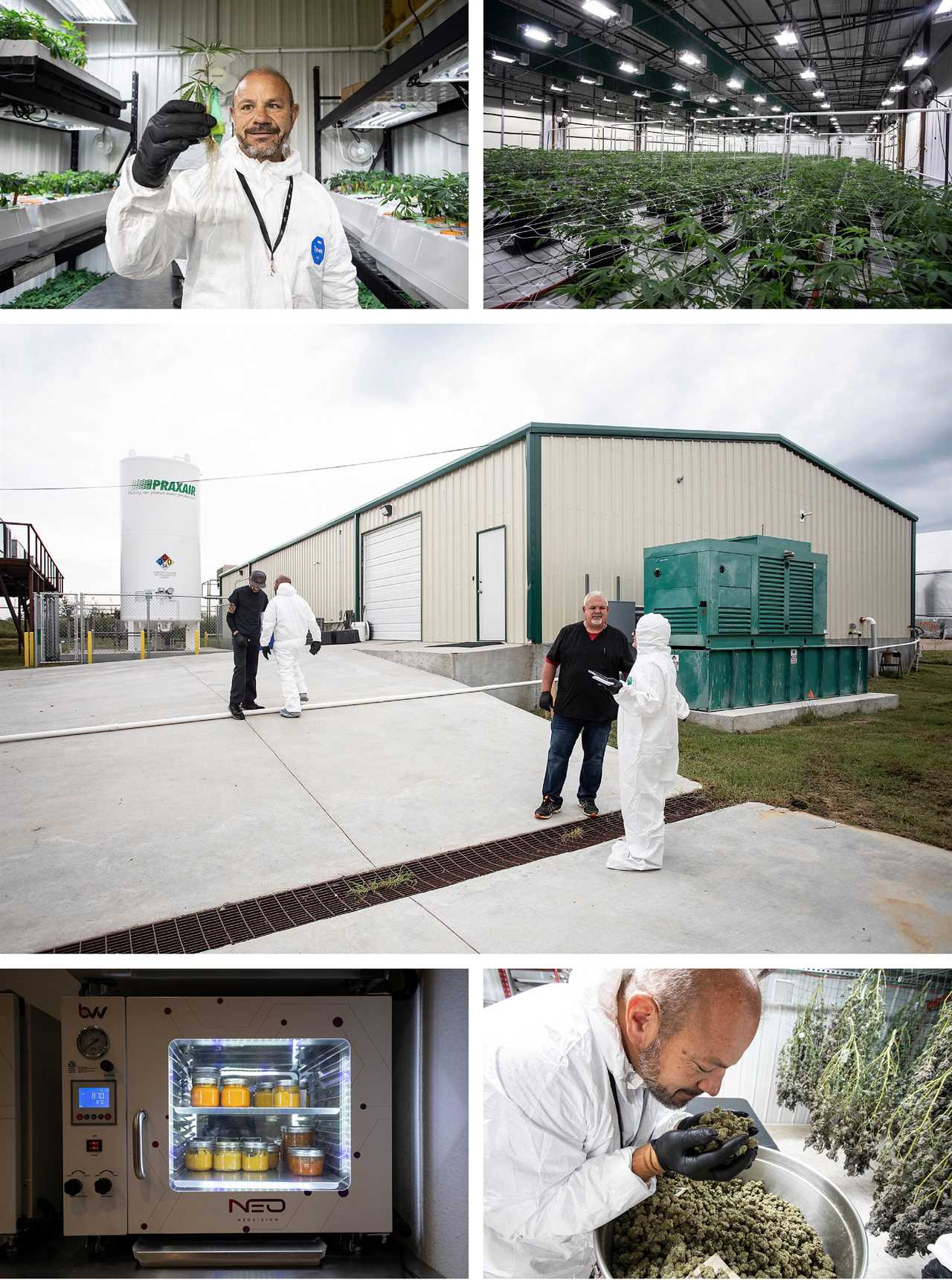
When I spent time in Oklahoma a year ago reporting on the state’s booming cannabis industry, weed entrepreneurs frequently assailed efforts by the state to create more stringent guardrails around the program, particularly its plan to install a statewide seed-to-sale tracking system. Most industry officials thought the number of licensed businesses would begin to organically decline as the market matured and struggling operations failed. But over the last year, the number of businesses has only continued to skyrocket, growing by nearly 50 percent. That’s led to a very different refrain from business owners around the state, with many of them practically begging the state to crack down on bad actors.
Rocky Atencio, 49, is best known around Ardmore as the owner of the Chrysler and Hyundai dealerships and as the long-time high school wrestling coach. But like so many other locals, he couldn’t resist the lure of the legal marijuana business.
He started Rocktop Wellness, an indoor cultivation facility, in 2018 in Ardmore. He opened Rocktop Processing the following year. The company’s pre-rolls, edibles and concentrates are now available under the White Mousse Oklahoma brand in about 1,000 dispensaries across the state. Atencio is in the process of opening his first dispensary in Chickasha and hopes to have 10 more pot shops operating by the end of next year.
“I don’t have a problem with competition. Matter of fact, I thrive on competition. I love competition,” said Atencio. “I just don’t like competition when they’re not abiding by the same rules I have to abide by. I don’t care what the rules are. I just need to know what the rules are. And there’s no rules right now.”
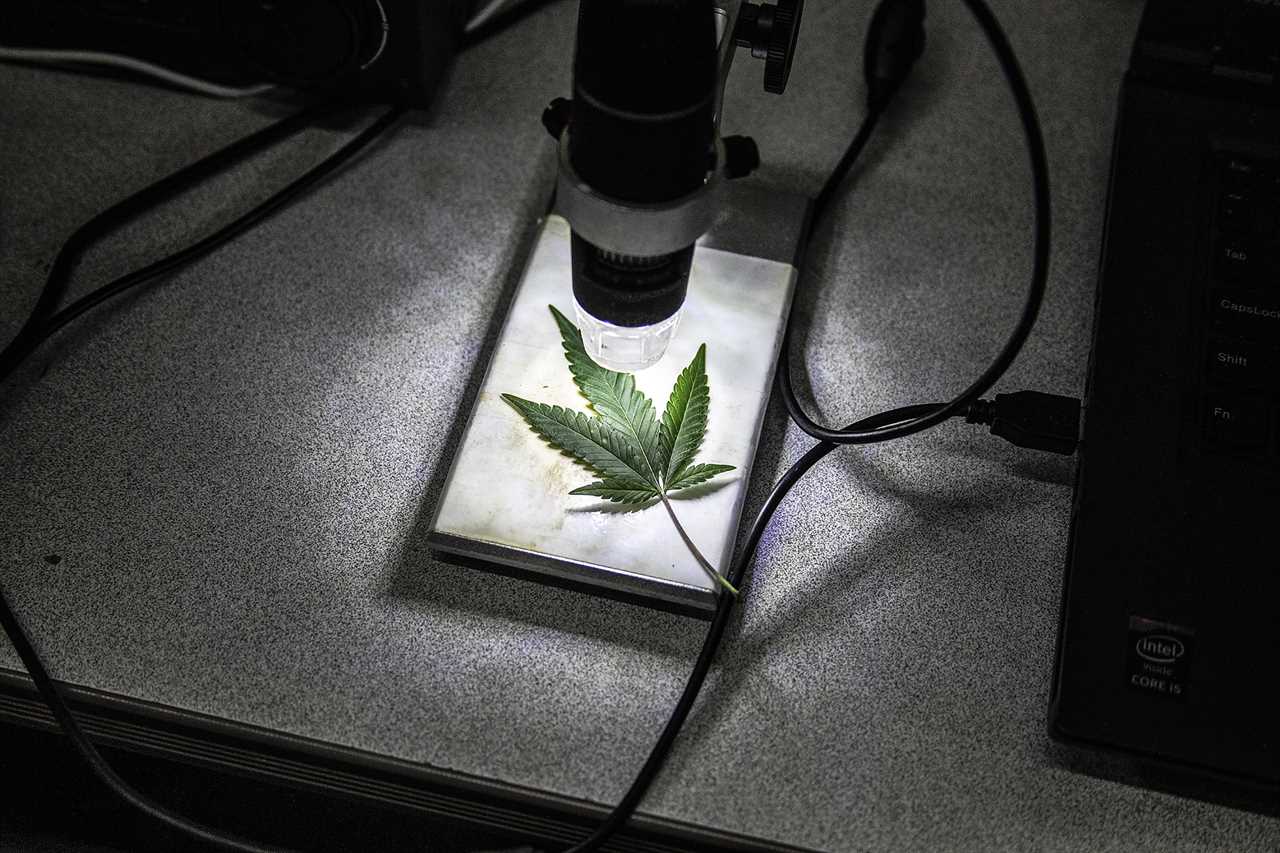
‘A once-in-a-lifetime, million-dollar thing’
One of the strangest wrinkles in Oklahoma’s runaway weed market is told in lawsuits that have been filed in courthouses all over the state. The basic details vary from case to case, but in one important respect they resemble what happened to a 25-year-old electrical engineer from California.
In January 2020, Zai Fu Xiang sold his belongings, borrowed funds from his family and headed to Weleetka, Oklahoma to grow weed. Xiang, according to the suit he would file in September against the state of Oklahoma in Okfuskee County District Court, anticipated that he would need to wait two years before he could actually obtain a license to legally grow marijuana for Oklahoma’s medical market due to the state’s residency requirement.
But some people he knew in the cannabis industry said there was a faster way. They suggested he contact Jones Brown, a small Tulsa law firm that historically has focused on personal injury and labor law but has increasingly specialized in marijuana licensing. At a March 2020 meeting, Xiang received some seemingly welcome news: He didn’t need to adhere to the two-year waiting period for obtaining a cultivation license.
Instead, Xiang says in his lawsuit, he was told by the firm’s attorneys that he could hire Kathleen Windler — a secretary at the law firm — as a consultant and she could stand in as the lawful Oklahoma resident needed to qualify for a license. In addition, Xiang was told that Windler — despite being listed as the primary owner for licensing purposes — would not have any decision-making authority over his company, known as Professor Weed.
Xiang paid Jones Brown $11,500 and received a marijuana grow license from the Oklahoma Medical Marijuana Authority on April 22, 2020. A little over a year later, he obtained a registration number from the Oklahoma Bureau of Narcotics and Dangerous Drugs. Xiang leased 22 acres in Okfuskee County and invested approximately $120,000 in setting up a marijuana grow operation on the site, including a dozen greenhouses. The former electrical engineer soon had cannabis plants in the ground.
“Hundreds” of other prospective Oklahoma cannabis entrepreneurs followed a path similar to Xiang’s, according to court records. Following the advice of lawyers at Jones Brown, they hired Windler as a consultant and were able to obtain business licenses by relying on her to meet the state’s residency requirement.
But on May 21, Windler, 68, was arrested and charged with three felonies stemming from the alleged illegal cultivation of more than 6,000 cannabis plants in Pauls Valley. Four men also face felony charges related to illegal marijuana cultivation at the same property. Windler’s indictment triggered the unraveling of hundreds of businesses, including Professor Weed’s, that law enforcement officials say are tied to “ghost” owners. They further allege that many have ties to international criminal gangs, taking advantage of Oklahoma’s loose rules to establish quasi-legal businesses with the intent of growing marijuana for the illicit market. (Attorneys representing Windler declined to comment on the charges.)
“Nobody forced these people to put their names on these licenses. It was a choice they made,” said Woodward, the Oklahoma Bureau of Narcotics spokesperson. “If they got bad legal advice, or whatever excuse they want to use at the end of the day, they are still tied to a criminal organization.”
But cannabis lawyers say the residency rules are legally murky, and that there are perfectly legitimate ways to obtain a license even if a business owner doesn’t meet the requirements. They simply can partner with an Oklahoma resident who has lived in the state long enough to qualify.
But they say that the way Jones Brown and some other law firms went about securing business licenses — with a single Oklahoma resident used on dozens of applications — has led to the current mess.
“I think there are other crappy lawyers that didn’t stop to think about the safety and benefit of their clients,” said Donald Gies III, an Oklahoma City attorney who represents several clients who have gotten caught up in the cannabis cultivation crackdown. “They were just worrying about the bottom dollar and saying, ‘Hey, maybe this is a once-in-a-lifetime, million-dollar thing.’”
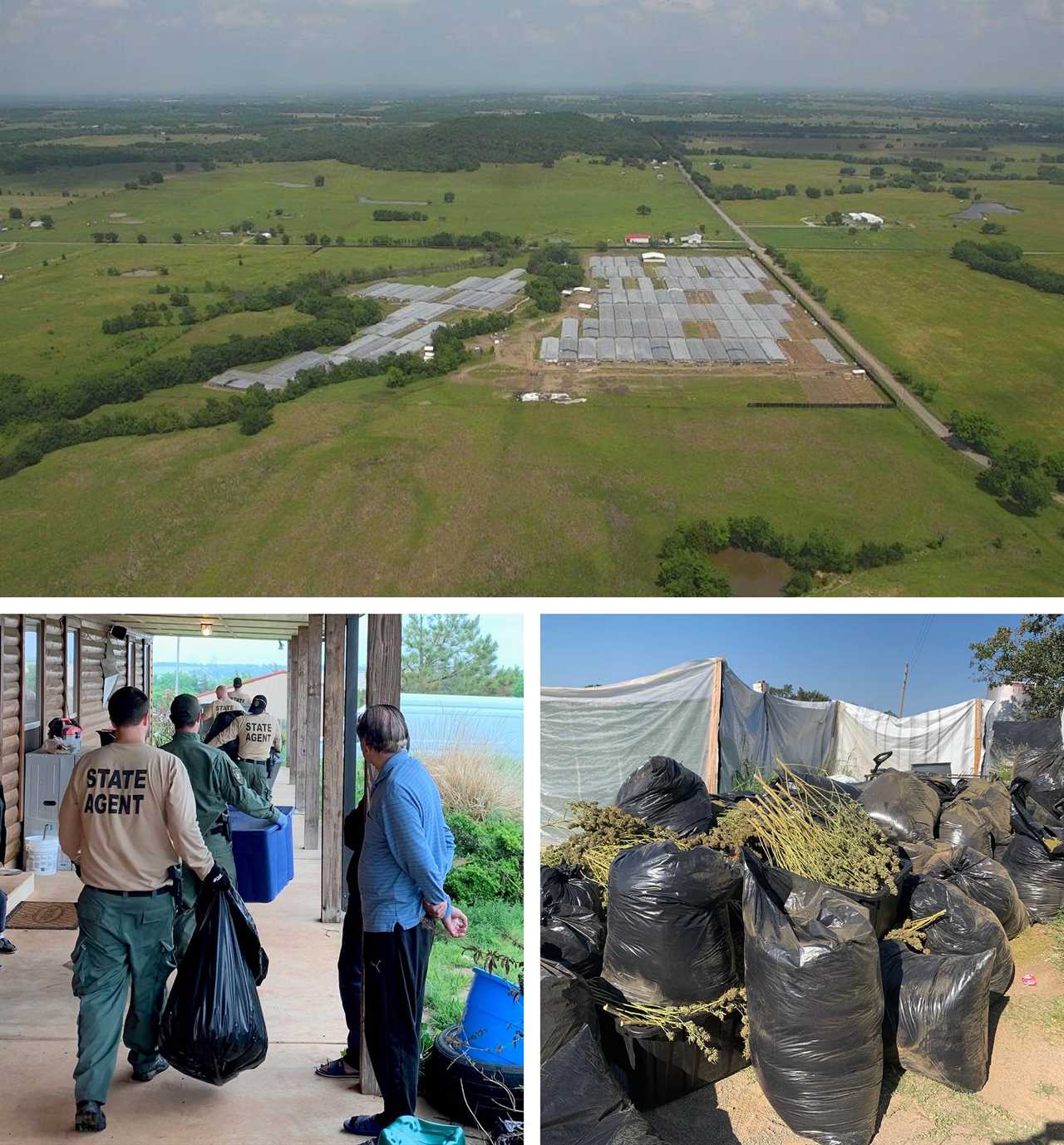
In fact, most legal observers believe that the residency requirement is unconstitutional and would be struck down if challenged in court. A similar requirement in Missouri was recently invalidated by a federal judge.
“They don’t want to rock the boat on residency. Nobody’s wanted to challenge that,” said Rachel Bussett, an attorney with dozens of cannabis clients. “Do I think it’s challengeable? I absolutely, 100 percent think it’s challengeable.”
Windler is now suing her former employer. In a lawsuit filed in Cleveland County District Court in September, Windler claims that she, too, was victimized by improper legal advice from Jones Brown attorneys, and that it has put her in grave legal peril. She’s seeking damages in excess of $75,000 and legal and financial protections from any lawsuits stemming from her work on behalf of the law firm.
“Defendants have been attempting to deflect and divert the ire, litigation, complaints, and demands of the potential hundreds of aggrieved parties onto Plaintiff and deny any role in the wrongdoing that exposed plaintiff to potential prison time,” Windler’s lawsuit states.
Jones Brown has filed a motion to dismiss the case, arguing that there’s no legal grounds for Windler’s claims. Specifically, the firm argues that the area of law on which the claims hinge is “vague and unsettled, particularly the nature of the term ‘ownership’ of marijuana businesses, and Plaintiff failed to allege sufficient facts to show negligence or fraud.”
Attorneys with Jones Brown declined to be interviewed for this story. They have not been charged with any crimes related to their marijuana licensing work. “I have no comment other then what is in the public record,” David Cheek, who is representing Jones Brown in Windler’s lawsuit, wrote in an email to POLITICO.
In August, Xiang and dozens of other licensees received notifications that their licenses had been surrendered by Windler, essentially putting them out of business. That prompted Xiang and many others to file lawsuits seeking to protect their companies, arguing that Windler had no authority to surrender their licenses and that state officials failed to follow proper procedures in punishing them.
So far, the courts seem sympathetic to their claims.
On Sept. 9, Okfuskee County District Court Judge Lawrence Parish issued a temporary restraining order blocking state officials from forcing Professor Weed to cease business operations or destroying the company’s property. Similar restraining orders have been issued or are being sought in courts across the state.
Durbin, who represents Xiang, and other attorneys argue that people who were trying to act legally but received shoddy legal advice that’s put their businesses in jeopardy, should be given an opportunity to correct their paperwork instead of having their licenses invalidated.
“It’s not that complicated of a process to weed out, for lack of a better phrase, the bad actors in this industry,” Durbin said. “It’s just a question of people using common sense and having a plan, and quite frankly in Oklahoma we still don't have a plan.”
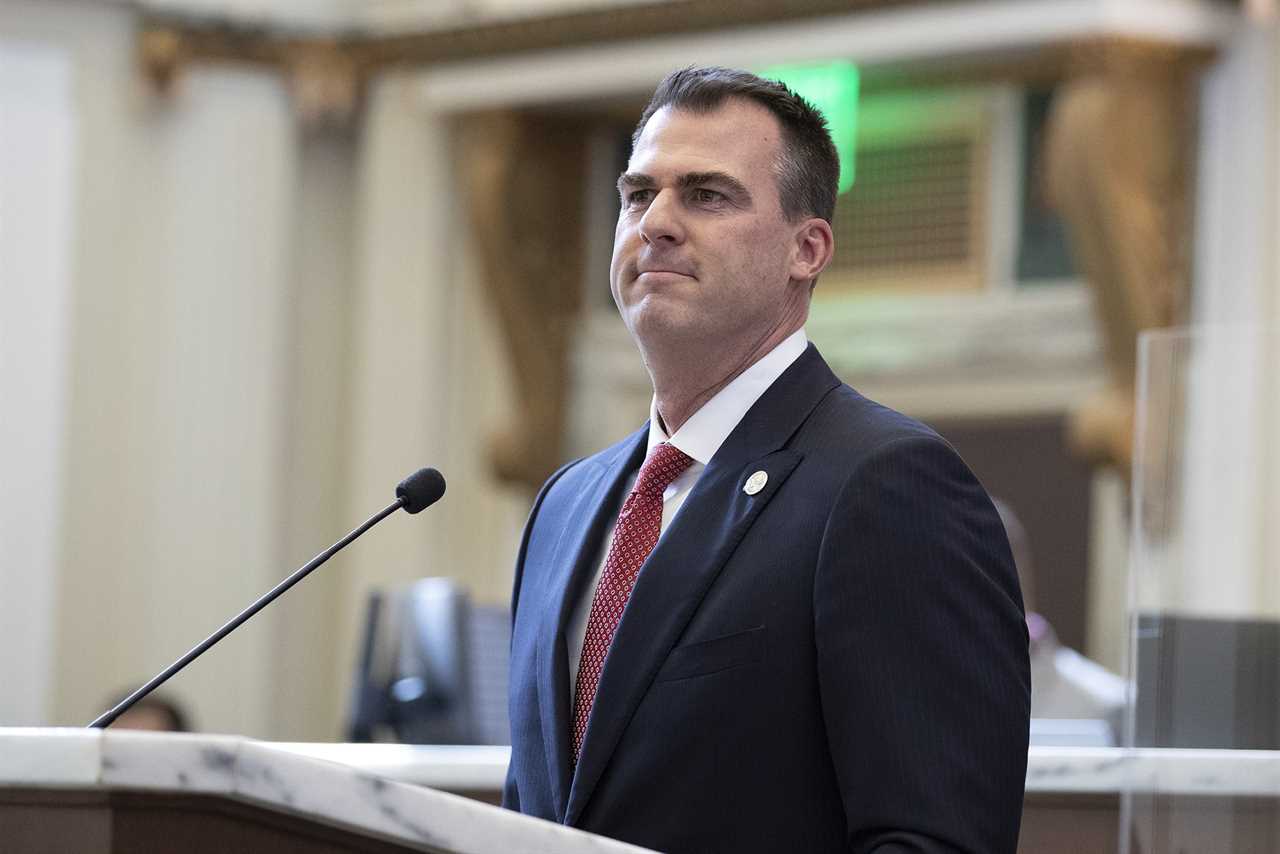
‘It’s a coin flip at best’
Kevin Stitt has made reducing the state’s already notoriously lax business regulations a hallmark of his administration — vowing to cut red tape by at least 25 percent by the end of his current term. But when it comes to the cannabis industry, the Republican governor is promising a more stringent approach.
In mid-August, Stitt announced a shakeup at the Oklahoma Medical Marijuana Authority, installing Adria Berry as the new executive director of the agency.
“Foreign nationals are gobbling up land in rural communities and drug traffickers are exploiting our laws and threatening our public safety,” Stitt said in a press release announcing the change. “Adria Berry is the right leader to help us solve these problems and protect Oklahomans.”
Berry, the fourth leader of the OMMA since it was created three years ago, is an unlikely choice for the post. As vice president of government affairs at the State Chamber of Oklahoma, which lobbies on behalf of state businesses, she campaigned against passage of the medical marijuana referendum in 2018, arguing that it would create big problems for employers.
But since taking the post, Berry has been adamant that she isn’t opposed to the medical marijuana program. She’s merely intent on fixing the problems plaguing it and ensuring that its operations are safe and legal.
“This is an opportunity to do something that actually will make a difference in the day-to-day lives of Oklahomans, if we can get this agency moving in the right direction,” Berry told POLITICO in a recent interview.
Most significantly, Berry is beefing up the agency’s enforcement capabilities. OMMA is in the process of hiring 62 invetigators and other compliance personnel by Dec. 1, more than doubling the current staffing. The goal is for the agency to have the capacity to inspect all licensed businesses annually. In addition, OMMA has hired six investigators to work in partnership with the Oklahoma Bureau of Narcotics on criminal investigations.
Berry also cites implementation of a seed-to-sale tracking system as a top priority so there’s more transparency about where products are being manufactured, transported and sold.
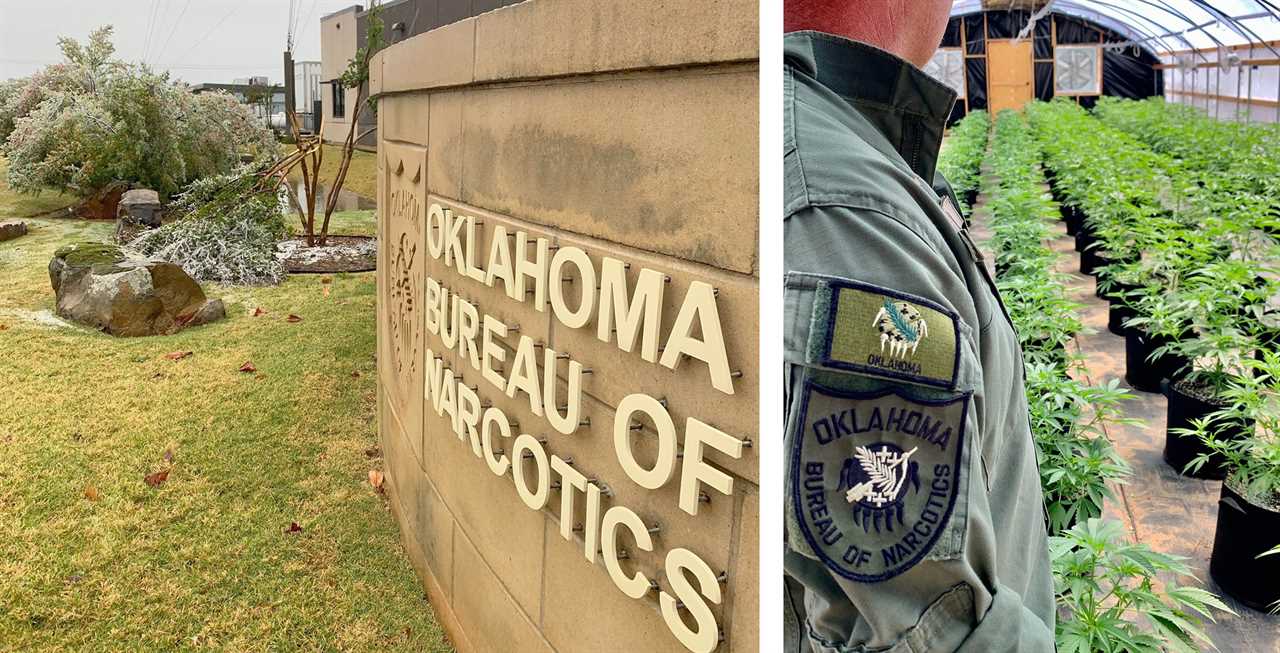
“Once we get the seed-to-sale in place, we will have the ability to really combat the illegal activity and have our eyes on how much marijuana should be in the state versus how much there actually is,” Berry said.
OMMA announced in September 2020 that it had hired Metrc, which operates similar tracking systems in 14 other states and the District of Columbia, to operate the system. But implementation has been put on hold due to a class-action lawsuit challenging the contracting process. Many businesses — even some that were initially wary of being forced to spend money to adopt the Metrc system — have grown frustrated at the delay in implementing it.
So far, Berry is largely receiving cautious accolades from lawyers, lawmakers, advocates and business owners involved in the medical marijuana industry. They generally agree that more vigorous enforcement of the rules is needed so that businesses have a shot at being financially viable.
“I have complete confidence in Director Berry,” said Fetgatter, the state representative who has been deeply involved in marijuana issues. “That being said, she’s got a big hill to climb.”
Meanwhile, the push to expand the scope of legalized marijuana continues. Advocates hope to begin collecting signatures early next year for a pair of referendums they would like to place on the ballot. One would enshrine the right to use medical marijuana in the state’s constitution. The other would allow anyone at least 21 years old to purchase and use marijuana.
But even supporters of full legalization acknowledge that the rash of raids on illegal grow operations and allegations of international drug smuggling have sparked a backlash, particularly in rural parts of the state. In September, four agriculture groups and the Oklahoma Sheriffs’ Association sent a letter to Berry calling for an immediate moratorium on allocating additional marijuana cultivation licenses until enforcement is bolstered and a tracking system is implemented.
Jed Green, who is leading the effort to get the legalization referendums on the 2022 ballot, acknowledges that full legalization will be a difficult sell. He says that polling has shown support for recreational sales at less than 45 percent.
“I think it’s a coin flip at best,” Green said during a recent press conference at the Capitol in Oklahoma City. “That’s why we have two. We’re not trying to shove anything down anyone’s throat. We are here to provide an option.”
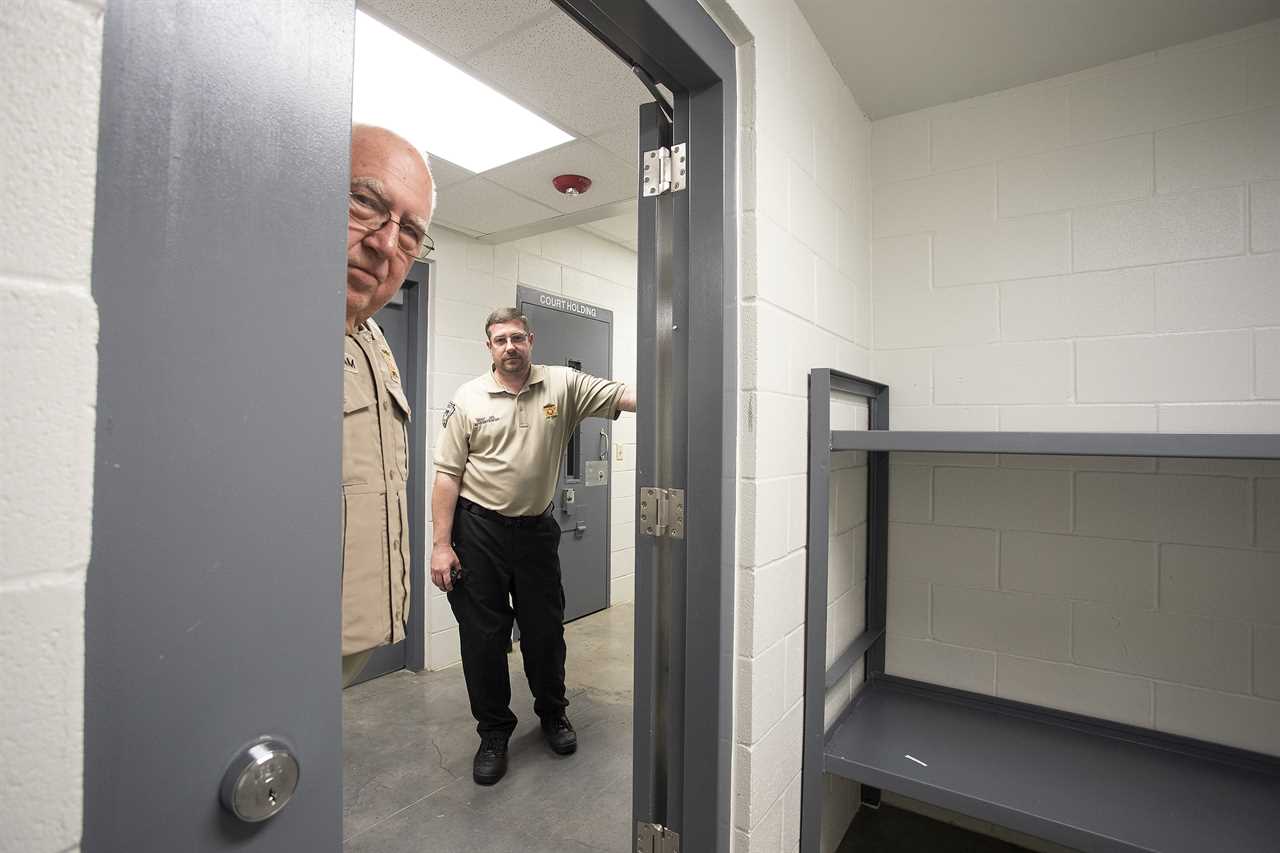
‘We’ve just gotten more liberal’
Back in Love County, Sheriff Grisham, who led the raid on the Marietta property in July, seems to embody all the conflicting attitudes about a legalized marijuana system that has been both a massive success and also a massive headache.
Grisham spent nearly three decades as a state trooper before retiring. He decided to run for sheriff in 2016 after the former officeholder was arrested on corruption charges. So he comes to the job with a lifetime of experience combating drug crime. But the state has undergone a radical shift in how it defines and deals with drug crime since he re-entered law enforcement. Like many of the people he serves, Grisham has struggled philosophically with how to respond to changes that have transformed Oklahoma from one of the most punitive states when it comes to drug use to one of the most liberal.
Recently, as we rode in his pickup truck down Highway 77, he told me he hears complaints about the massive growth of marijuana businesses all the time, particularly since the raids on illegal operations started.
“People are rather angry about it,” he said. “They’d like me to shut down every grow in the county, but I can’t do it.”
He’s not even sure he wants to.
Grisham didn’t support the medical marijuana legalization referendum in 2018, but he seems more bewildered than angry about the dramatic change in the state’s approach to the drug. In fact, he mused out loud, if he ever retires, he might even try a pot brownie.
“If the medical marijuana will help a person,” Grisham told me, “then I don’t have a problem with it.”
He is more troubled by the passage of a referendum in 2016 that made most drug possession crimes in Oklahoma a misdemeanor, a stark reversal in a state that has long been notorious for having some of the country’s harshest drug laws.
“To me that has hurt us about as bad as anything,” said Grisham, an avowed supporter of former President Donald Trump. “I hate to use the word more liberal. We’ve just gotten more liberal with our laws and with drugs.”
----------------------------------------
By: Paul Demko
Title: ‘There’s No Rules Right Now’: Inside Oklahoma’s Surprising Weed Crackdown
Sourced From: www.politico.com/news/magazine/2021/11/12/oklahoma-marijuana-laws-520311
Published Date: Fri, 12 Nov 2021 04:30:19 EST






